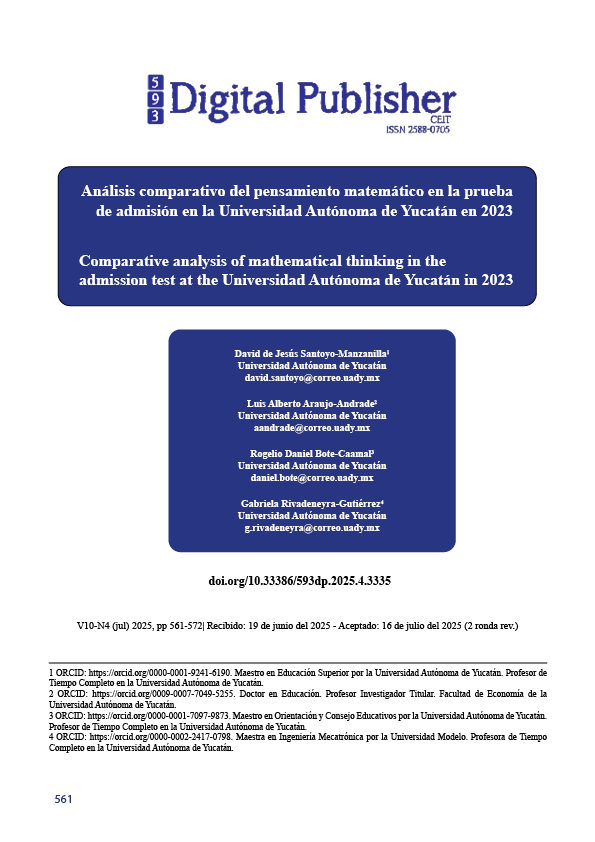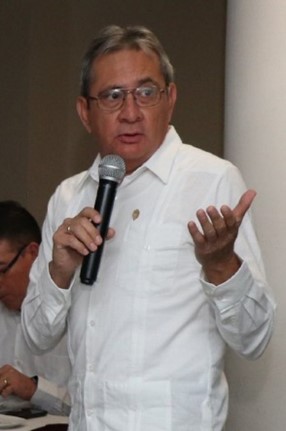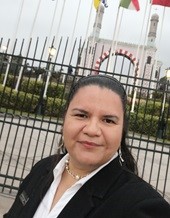Comparative analysis of mathematical thinking in the admission test at the Universidad Autónoma de Yucatán in 2023
Main Article Content
Abstract
Mathematical thinking is an important skill for university admission due to its correlation with other variables of academic success. Therefore, the objective of analyzing and comparing the mathematical thinking of applicants for UADY (Universidad Autónoma de Yucatán) bachelor's degrees in the 2023 process was proposed. To do this, a database was created with the 11,776 applicants and a comparative analytical study was carried out. The results indicate that 29% of applicants are admitted and that the campus with the highest demand for applicants is located on the Health Sciences campus, which makes it more competitive and less likely to enter a bachelor's degree. The campus with the highest probability of admission is Unidad Multidisciplinaria Tizimín with 57.3% admission. On the other hand, it was also found that the campus with the highest score for mathematical thinking was the Health Sciences campus and the one with the lowest score was Unidad Multidisciplinaria Tizimín. Descriptive statistics show that there are students who were admitted due to their overall EXANI-2 score but who have a low score in mathematical thinking. It is concluded that mathematical thinking is an important factor for new students and that ensuring this ability raises the academic and scientific standards of the university as an academic and scientific training institution.
Downloads
Article Details

This work is licensed under a Creative Commons Attribution-NonCommercial-ShareAlike 4.0 International License.
1. Derechos de autor
Las obras que se publican en 593 Digital Publisher CEIT están sujetas a los siguientes términos:
1.1. 593 Digital Publisher CEIT, conserva los derechos patrimoniales (copyright) de las obras publicadas, favorece y permite la reutilización de las mismas bajo la licencia Licencia Creative Commons 4.0 de Reconocimiento-NoComercial-CompartirIgual 4.0, por lo cual se pueden copiar, usar, difundir, transmitir y exponer públicamente, siempre que:
1.1.a. Se cite la autoría y fuente original de su publicación (revista, editorial, URL).
1.1.b. No se usen para fines comerciales u onerosos.
1.1.c. Se mencione la existencia y especificaciones de esta licencia de uso.
References
Alzahrani, A. R. R. (2024). Longitudinal PLS-SEM analysis of the performance and participation of students in mathematics. AIMS Mathematics, 9(8), 22680-22696. https://doi.org/10.3934/math.20241105
Atit, K., Power, J. R., Pigott, T., Lee, J., Geer, E. A., Uttal, D. H., Ganley, C. M., & Sorby, S. A. (2022). Examining the relations between spatial skills and mathematical performance: A meta-analysis. Psychonomic bulletin & review, 29(3), 699–720. https://doi.org/10.3758/s13423-021-02012-w
Aulia, R., Rohati, & Marlina. (2021). The Students' Self-Confidence and Their Mathematical Communication Skills in Solving Problems. Edumatika: Jurnal Riset Pendidikan Matematika, 4(2), 90–103. https://doi.org/10.32939/ejrpm.v4i2.770
Boaler, J. (2015). Mathematical mindsets: Unleashing students' potential through creativemath, inspiring messages and innovative teaching. Jossey-Bass. https://eric.ed.gov/?id=ED620466
Creswell, J. W., & Creswell, J. D. (2018). Research design: Qualitative, quantitative, and mixed methods approaches (5th ed.). SAGE Publications.
García González, M. del S., Cortés Ortega, J., & Rodríguez Vásquez, F. M. (2020). “Aprender matemáticas es resolver problemas”: creencias de estudiantes de bachillerato acerca de las matemáticas. IE Revista De Investigación Educativa De La REDIECH, 11, e726. https://doi.org/10.33010/ie_rie_rediech.v11i0.726
Gray, E., Tall, D. (2007). Abstraction as a natural process of mental compression. Mathematics Education Research Journal 19, 23 – 40. https://doi.org/10.1007/BF03217454.
Hidayat, R., Mohd Saad, M. R., & Wewe, M. (2025). A meta-analysis of the effect of metacognitive instruction on mathematics achievement. Cogent Education, 12(1). https://doi.org/10.1080/2331186X.2025.2517510
Makhoul, S. A. (2019). Higher education accreditation, quality assurance and their impact to teaching and learning enhancement. Journal of Economic and Administrative Sciences, 35(4), 235-250. https://doi.org/10.1108/JEAS-08-2018-0092
Mason, J., Burton, L., & Stacey, K. (2010). Thinking Mathematically (2 ed.). Harlow, UK: Pearson Education Limited. https://www.mymathscloud.com/api/download/modules/11/Interview-Advice/Thinking%20Mathematically.pdf?id=apHfjK8WSr2JDG8FXMhFnw
Peters, E., & Bjalkebring, P. (2015). Multiple numeric competencies: When a number is not just a number. Journal of Personality and Social Psychology, 108(5), 802–822. https://doi.org/10.1037/pspp0000019
Saadati, F., & Celis, S. (2023). Student motivation in learning mathematics in technical and vocational higher education: Development of an instrument. International Journal of Education in Mathematics, Science, and Technology (IJEMST), 11(1), 156-178. https://doi.org/10.46328/ijemst.2194
Sani, K. M., Adam, M. M., Nadama, S. G., Muhammad, F. A., Udu, M. S., Mohammed, F., & Datti, A. Y. (2024). Exploring the Factors Contributing to Poor Academic Performance among Senior Secondary School Students: A Case of Wamakko Local Government Area, Sokoto State. EduLine: Journal of Education and Learning Innovation, 4(4), 580-593. https://doi.org/10.35877/454RI.eduline3070
Schoenfeld, A. H. (2017). Uses of Video in Understanding and Improving Mathematical Thinking and Teaching. Journal of Mathematics Teacher Education, 20, 415-432. https://doi.org/10.1007/s10857-017-9381-3
Star, J. R., & Stylianides, G. J. (2013). Procedural and Conceptual Knowledge: Exploring the Gap Between Knowledge Type and Knowledge Quality. Canadian Journal of Science, Mathematics and Technology Education, 13(2), 169–181. https://doi.org/10.1080/14926156.2013.784828
Steenbergen-Hu, S., & Cooper, H. (2013). A meta-analysis of the effectiveness of intelligent tutoring systems on K–12 students’ mathematical learning. Journal of Educational Psychology, 105(4), 970–987. https://doi.org/10.1037/a0032447
Universidad Autónoma de Yucatán, (2023). Convocatoria para el ingreso a licenciatura (modalidad presencial). Disponible. https://ingreso.uady.mx/licenciatura/docs/conv.pdf
Weber, K., & Mejía Ramos, J. P. (2019). An empirical study on the admissibility of graphical inferences in mathematical proofs. In A. Aberdein & M. Inglis (Eds.) Advances in Experimental Philosophy of Logic and Mathematics. (pp. 123-144). London: Bloomsbury. https://doi.org/10.5040/9781350039049.0009
Wyness, G. (2017). Disadvantaged students and the university. https://www.suttontrust.com/wp-content/uploads/2019/11/Rules-of-the-Game.pdf





